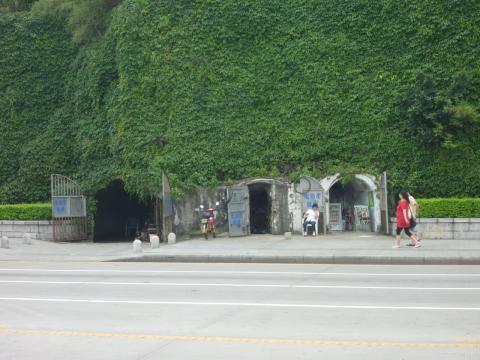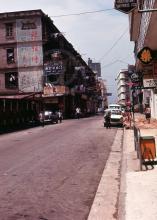Tunnels under Amoy
Primary tabs
This was an unexpected bonus. A tunnel runs into the hill opposite our hotel, and leads to an underground theatre!
Here's what I saw as the taxi pulled up at the hotel:
We went over for a look the next day. As you'll see in the video, the tunnel on the left is a good size, with concrete floors and walls. As it was lit up inside, we went in for a look. Didn't get very far though, as someone started shouting that we weren't allowed to be there.
Back out to the entrance a very unofficial looking man was waiting for us. (Though later we noticed road-sweepers wearing the same nylon jackets - probably standard local government garb). After chatting, he said he could show us inside if we wanted "but it'll cost you". Turns out he only wanted 10RMB, so yes please!
He sent a younger man to get a torch, then take me into the tunnel. We walked for a couple of minutes, then turned right into what was obviously a much larger space. "Can I take a photo?" "Sure - oh hold on, and I'll switch the lights on for you."
So off went the man and his torch, and as I stood in complete darkness I wondered if this had been such a good idea. Then I heard his footsteps as he ran back. On with the light switch, and this is what I saw:
The facts are a bit garbled, as I didn't understand everything he said, and his story was slightly different from his boss, who stayed outside chatting to my wife. But I think:
- The tunnel was dug in the 1930s and is related to the Japanese. I'm not sure if the Chinese dug it as protection against the Japanese, or it was dug during the Japanese occupation.
- There are around 1,000 metres of tunnel, including several side tunnels. The side tunnels have locked gates across them, and neither guide nor boss had ever been inside them.
- The main tunnel used to be open at both ends, but now one end is blocked. (It didn't seem too stuffy though, so there should be another opening somewhere).
- The tunnels are owned by the Navy. That seems possible, as a short distance along the road you can see a big Naval building on this hill.
The entrance is on Zhenhai Road, opposite the Millenium Hotel.
Today's city street map shows several more tunnels. They are road tunnels, but at first glance they look crazy - long tunnels cut through low hills, when it's hardly any detour to go around them. Neither these road tunnels nor the connecting roads appear on the 1945 map, so I guess they were built during the cold war with Taiwan. Then they'd serve a double purpose as military / civilian shelters, as well as road tunnels.
It makes me wonder if the tunnel I went in was really as old as the 1930s, or if dates to the cold war too?
If you know can confirm when and why this tunnel was built, please could you leave a comment below?
Thanks, David



Comments
Re: Tunnels under major Chinese Cities
Hi there,
My Putunghua is terrible, but I will try to watch the movie again when I'm home with sound on and see if I could catch anything.
I guess it might have something to do with the 'Cold War' period, the arm race, and part of that period coincided with the 'Cultural Revolution' disaster. The water basins triggerred some faint memory about a documentary about such underground facilities somewhere else.
I remember it was in the news that some city had such facilities developed into hostels. But I have forgotten which city.
Best Regards,
T
Re: part of the dialogue
Hi there,
With my limited Putunghua I could only catch a few lines:
Around 2:33 the locked up storage area with lights, the guy mumbled also something about Chang Ku. That was why it got locked-up.
I think that could be 撐固 .I am not familiar with this term, maybe some civil engineer might help to explain. My guess is they are doing some maintenance work about the structural integrity of the tunnels and caves network.
At around 2:55 The guy answered, only at war was the network in use. He did not refer to which war though.
I'll try to watch it some more and see if I could catch a bit more.
Best Regards,
T
My mandarin is no good but I
My mandarin is no good but I believe "chang ku" meant 倉庫 which means depot.
Thanks for this interesting post and the video.
See this for the
See this for the pronounciation of the term:
http://en.wiktionary.org/wiki/%E4%BB%93%E5%BA%93
Also at 2:32 of the video, you can see some chinese words on the left side of the room entrance. The words mean "a room used for the recording / playing of videos", which would appear to be consistent with the explanation giving by your guide during your tour of the cave. However, I doubt this was the original purpose for which the cave system was built. Shelters from air raid / bombardment from Taiwan would be my guess.
Re: You are quite right.
Hi there,
You are quite right. That looked more like a storage area.
Best Regards,
T
re: Tunnels under Amoy
Thanks for your help - "Storeroom" makes sense.
Although we think of these tunnels as something dating back to the cold war, they're still building them today. Chinese company Renhe describes their business as:
[...] engaged in developing and operating underground shopping malls underneath the main trunk roads in bustling wholesale business centers in large and medium cities across China. It is one of China’s most well-established developer and operator of underground shopping malls.
But why go to all the trouble of building a mall underground? Fortune magazine explains:
To say that Renhe Commercial Holdings has an unusual line of business would be an understatement: The Harbin-based company develops air-raid shelters in China -- on behalf of the Chinese government -- that double as underground shopping bazaars.